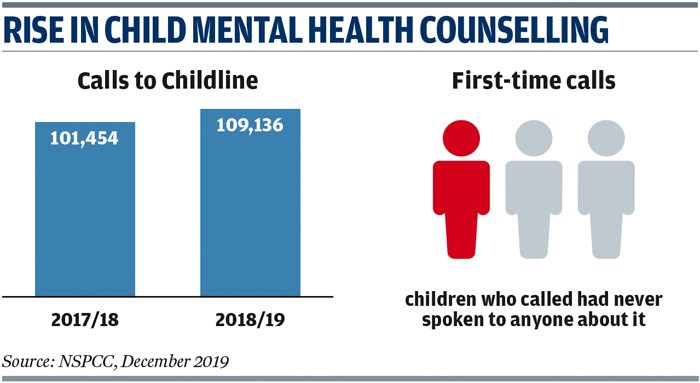Solutions to crisis in CAMHS
By Derren Hayes
Thursday, January 2, 2020
New government must recognise and solve growing crisis in children’s mental health support, say experts

There is growing evidence that increasing numbers of children are struggling to access support from the NHS for mental health problems.
The NSPCC’s Childline advice service recently reported an eight per cent rise in the number of children who called it seeking counselling over mental health concerns (see graphics).
A recent survey of 10,000 teachers by the National Education Union found that 80 per cent believed mental health support had deteriorated over the past two years.
Meanwhile, a report published in December by the Association of Directors of Children’s Services (ADCS) includes a host of examples of where children are finding it harder to access services, and criticises a number of key policies developed by the government for their failure to properly address the issue.

School-based provision
Through measures introduced as part of the 2018 Children’s Mental Health white paper, clusters of schools are trialling mental health support teams to provide a link with child and adolescent mental health services (CAMHS).
It is anticipated that around a third of schools and colleges will be covered by 2023, but the ADCS says the plans are not ambitious enough, particularly the decision to bar “inadequate” rated settings from participating because they “may have learners with some of the highest levels of need”.
The ADCS backs the Local Government Association’s call for mandatory on-site school counselling services for every pupil in secondary and alternative education provision.
It also says plans published in January 2019’s NHS Long Term Plan to improve children’s mental health are “inadequate”.
“Its focus on children is limited only to specific cohorts, and those with specific conditions,” it states. “This is a missed opportunity to have taken a broader view of children’s general health needs across the whole of childhood.”
In-patient care
The association says the NHS Long Term Plan is also silent on the challenges facing specialist in-patient services for those with the highest needs. It says this is particularly concerning because its members report growing difficulties in accessing in-patient “Tier 4” CAMHS places, and this shortage is having a wider impact.
“The lack of Tier 4 beds is having a knock-on effect in the care system, particularly the capacity in secure children’s homes,” it states. “This very specialist form of provision is being used as a proxy for secure mental health services.
“As a result, frequently there are no welfare beds available in secure children’s homes anywhere in the country for those who require them.”
There is also evidence that lack of capacity throughout the system is resulting in health agencies prioritising children with a diagnosable mental health condition over those with emotional or behavioural needs “to gatekeep access to rationed CAMHS”, the report states.
Possible solutions
Campaigners and experts agree that urgent action is needed. The ADCS is calling for a review of specialist residential provision for children with complex mental health needs, while the National Youth Advocacy Service has launched a campaign calling for every child receiving mental health support to have a right to an advocate to ensure they get the help they need (see below).
- A Health Care System that Works for Every Child from www.adcs.org.uk
Children and young people with mental health needs should have an automatic right to an advocate
By Ben Twomey, head of policy and research, National Youth Advocacy Service
All children and young people have the right to have their voices heard in decisions made about them, including when understanding and navigating mental health services.
The role of an independent advocate is to listen to what children and young people want and empower them to get their voice heard. The advocate can ensure that the views, wishes and feelings of the young people are expressed and acted upon. This could include support such as helping them to understand their rights, have a say at care planning meetings, or raise concerns or complain about their care or treatment.
The benefit of a young person having an advocate is that they truly are on the side of the young person. The advocates are independent of children’s services, carers and health authorities, and do not judge or give personal opinions and only represent the young person’s views, wishes and feelings.
Advocacy at an earlier stage of engagement with CAMHS, or in following patients’ recovery out into the community, would mean that vulnerable children and young people would feel they had a personal “champion” who can enable them to be more in control of their lives and access the mental health support they need.
Care-experienced children and young people already have the right to an independent advocate, but our Looked After Minds campaign demands that all young people receiving any tier of mental health support services should have an active offer – or opt out – of independent advocacy services. We are campaigning to enshrine in legislation through amendments to the Children Act 1989 or Mental Health Act 1983 that young people who engage with CAMHS are made aware of their rights and can choose to opt out of an advocate if they do not want one.
Given that an estimated 65 per cent of young people who have a mental health need are not currently receiving any statutory service support, NYAS are also calling for this right to be extended to all children and young people.
Whether children and young people are having difficulty accessing services, need support at mental health appointments or want to put their voice across in care plans, advocacy at that stage could prevent escalation of mental health issues, uphold rights and give individuals greater control in their lives.
- Looked After Minds from www.nyas.net




